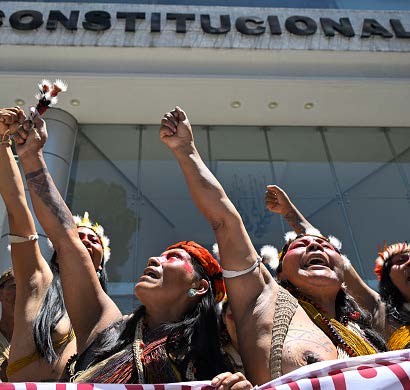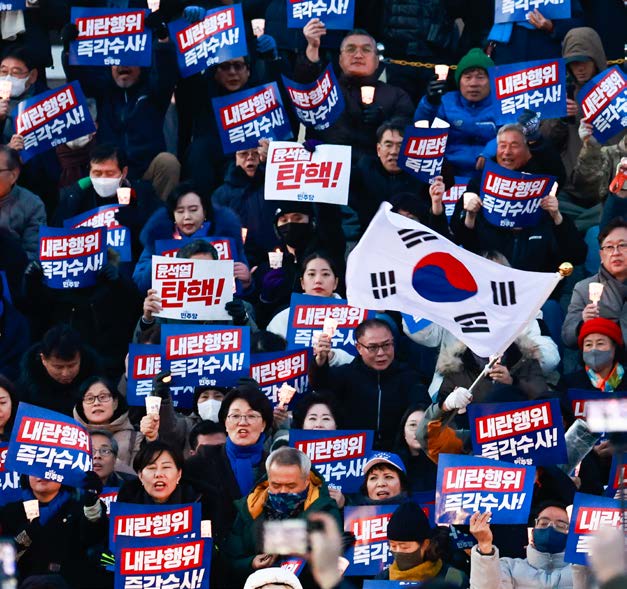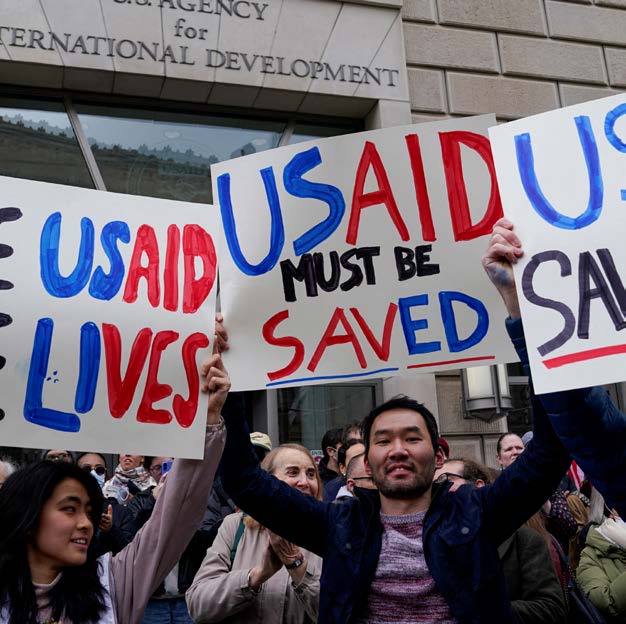Table of Contents
- 2025 State of Civil Society Report
- Overview +
- Conflict: might replaces right +
- Democracy: regression and resilience +
- Economy: the era of precarity and inequality +
- Climate and environment: heading in the wrong direction +
- Technology: human perils of digital power +
- Gender rights: backlash, resistance and persistence +
- Migrants’ rights: humanity versus hostility +
- United Nations: global governance in crisis +
- Civil society: the struggle continues +
- Acknowledgements +
- Download Report +

The world is experiencing multiple and accelerating crises. Civilians are being slaughtered in conflicts around the world – in Gaza, Sudan, Ukraine and many other countries – and perpetrators of atrocities are confident of enjoying impunity. A global realignment appears underway, driven by the Trump administration, which seems determined to reward acts of aggression, ripping up longstanding international alliances and shared assumptions in favour of an axis of authoritarianism. These shifts could trigger more wars as aggressors anticipate that they can use force to win advantage without facing consequences, potentially driving humanity towards a catastrophic global conflict.
Any progress achieved in forging a rules-based international order where human rights are respected risks being discarded in favour of the attitude that might makes right. A global governance crisis is seeing a lack of principled leadership. Instead of cooperation to solve the pressing problems that transcend borders, there’s a growing assertion of narrow national interest and transactional approaches to international relations. Military spending is increasing at the expense of aid for the world’s poorest and most vulnerable people.
Worsened by conflicts, the crises of climate change and biodiversity loss are accelerating, with 2024 the hottest year on record. Yet fossil fuel companies are reaping record profits, planning further extraction, scaling back renewable energy plans and using their economic power to lobby for inaction.
Soaring oil and gas profits are just one sign of a profoundly dysfunctional global economy, in which the world’s richest people just keep getting richer while many people struggle under a seemingly permanent cost of living crisis. The super-rich are no longer merely content with influence over policies that directly affect their wealth, such as on taxes. Increasingly they seek to control politics, raising legitimate fears of oligarchic state capture. Crony capitalism is reaching new levels, benefiting tech billionaires and media moguls who use their power to shape and distort political debate by spreading lies and hatred. A crisis of disinformation is being further accelerated by fast-moving developments in generative AI.

Members of the German CSO SOS Humanity help people from an overcrowded boat during a migrant rescue mission in the Mediterranean. Photo by Pietro Bertora/SOS Humanity.
Aided by disinformation, right-wing populism, nationalism and autocratic and military rule are on the rise, bringing a crisis of democracy as checks and balances, the right to express dissent and the ability to scrutinise the powerful are swept away. This crisis of democracy is also a civic space crisis, as fundamental civil rights are attacked wherever democratic freedoms are eroded. Anti-democratic forces are pushing anti-rights agendas that scapegoat and vilify excluded groups and attack their rights. Attempts to roll back the rights of women, LGBTQI+ people and migrants and refugees are well underway.
Just when civil society is most needed, it’s experiencing an accelerating funding crisis. In recent years, major funding sources such as state donor agencies have been cut back and become more aligned with narrowly defined national interests, particularly defence, diplomatic and trade agendas. This has made it harder for civil society organisations to secure support for core work and raised the risk of being instrumentalised around agendas that aren’t theirs. Many states have also passed laws to make it harder for organisations to receive international funding and vilify those that do so.
Several European states have reduced their support for civil society and others in the rest of the world have failed to fill the gaps, leaving implementation of the universal Sustainable Development Goals badly off track. Now the reckless, ill-intentioned USAID funding freeze has brought the crisis to a head. Many civil society groups face an existential threat.
The world needs civil society. Imagine life without it. Human rights violations and impunity would flourish on an even greater scale. Democracy would be further eroded and people would lose agency to shape decisions that affect their lives, with autocratic political leaders and oligarchs free to run amok, bending states to serve their interests. Climate change would accelerate past every tipping point and environmental breakdown would reach catastrophic levels. Women would lose control over their bodies and LGBTQI+ people would be forced into fearful, closeted lives. Excluded minorities would routinely face violence. These dangers are growing more pressing by the day.

Waorani Indigenous protesters demonstrate at Ecuador’s Constitutional Court against oil extraction in Yasuní National Park on 30 August 2024. Photo by Rodrigo Buendía/AFP via Getty Images.
Even under extraordinary pressure, civil society continues to prove its value. In conflict zones, grassroots groups are filling critical gaps in humanitarian response, documenting human rights violations and advocating for civilian protection. International allies are taking legal action and engaging with global institutions to try to stop the slaughter, halt arms supplies to human rights violators and hold perpetrators of atrocities to account.
In numerous countries, civil society has successfully mobilised to prevent democratic backsliding, ensure fair elections and challenge authoritarian power grabs. Struggles for gender equality and LGBTQI+ rights continue through persistent advocacy and campaigning, winning legislative and court victories despite intensifying backlash.
Through strategic litigation, civil society has established groundbreaking legal precedents to force governments to take more ambitious climate action and respect environmental rights. Environmental activists continue their vital work to hold states and corporations accountable despite facing extreme danger.
Across diverse contexts, civil society is employing a wide range of tactics – from mass mobilisation and online campaigning to legal action and international advocacy – proving it can and will hold the line in troubling and volatile times, even as civic space restrictions intensify and funding is deliberately slashed.
Civil society is a vital source of resistance, resilience and hope. Right now, things are bad, but without civil society they’d be even worse.
In tough times, it’s a challenge to be creative, and introspection may seem self-indulgent. But crises can present opportunities to experiment. The time has come to reimagine how civil society can ensure it’s able to keep defending and advancing human rights amid a cascade of crises.
A movement mindset is essential for civil society’s future. Rather than functioning as rigid bureaucratic organisations, structured to suit funder requirements, civil society groups must embrace flexibility. This means developing organisational forms that align with the changes civil society wants to see in the world and that make sense for the communities it serves.
The most successful civil society actions of recent years have embodied movement characteristics: distributed leadership, nimble decision-making, a focus on shared values, a willingness to listen and the ability to mobilise broad constituencies rapidly. The climate movement has shown how decentralised structures led by young people can drive action. Feminist movements offer lessons in building power through horizontal organising that connects people across class, race and geographic barriers, putting typically excluded voices at their centre. They’ve shown what it means to prioritise social change through collective action over institutional self-preservation.

Protesters hold a candlelight rally against President Yoon Suk Yeol’s martial law declaration outside the National Assembly in Seoul, South Korea, 4 December 2024. Photo by Daniel Ceng/Anadolu via Getty Images.
Civil society must prioritise authentic community connections, particularly with those most excluded from power. This means going beyond traditional stakeholder consultations to develop genuine relationships with communities, including those outside urban centres, disadvantaged by digital divides or otherwise far removed from decision-making structures and processes. Effective civil society work increasingly means facilitating community self-organisation and being accountable to those civil society exists to serve, rather than speaking on their behalf.
This implies substantial shifts in the way civil society operates. While many organisations are already walking this path, civil society as a whole still has a journey to make. Key steps include investing in deep listening, sharing power with community partners and learning to measure success by the strength of the relationships nurtured, and not just by outcome metrics.
Informed by its listening, civil society needs to develop effective counter-narratives. These should move beyond problem diagnosis to articulate compelling alternative visions to counter the seductive but dangerous narratives of populism, nationalism and authoritarianism. These counter-narratives must speak to people’s legitimate anxieties, including about economic precarity, security concerns and lack of voice, while inspiring optimism and offering inclusive and rights-based solutions that push back against populist appeals to scapegoat excluded groups.
Counter-narratives should connect universal values to local contexts and concerns. For instance, it may prove more effective to frame climate action in terms of community resilience, livelihood opportunities and fairness for coming generations than to talk about global summits and targets. Rather than mounting an abstract defence of key democratic principles, it may make sense to characterise democracy as a system capable of reacting to people’s preferences by delivering tangible benefits that improve their lives.
To respond to democratic regression and civic space degradation, early warning systems are needed. Civil society can develop these by tracking key indicators of closing space, from regulatory changes that may be presented as benign to more overt attacks on activists and organisations. These systems must be linked to rapid response mechanisms that enable coordinated national and international pressure when warning signs appear. The CIVICUS Monitor already tracks civic space globally, but more localised early warning systems with specific triggers for action could enhance preventive responses.
All responses must be based on the galvanising principle of solidarity in resistance. This means standing with each other when under threat and embracing the inherent value of mobilisation and participation beyond immediate policy wins. Even when victories seem distant, mobilising plays a critical role in bringing people together, nurturing collective identities, strengthening movement resilience, upholding hope and maintaining spaces where alternative visions and practices can flourish. Optimism must remain civil society’s guiding light.
To enable its responses, civil society must build and improve the functioning of networks at every level from local to global and across the broadest possible range of civil society and allies. Civil society’s resilience lies in its ability to build solidarity across issues, constituencies and geographies. These connections allow rapid mobilisation of support when crises emerge, the sharing of successful strategies and the pooling of resources and capacities. New technologies may facilitate connections, but networks can’t rely on them alone: they must be built on genuine trust and reciprocity. They should be horizontally organised and democratic, not top-down or global-north driven.

People protest outside the USAID building in Washington DC, USA, following closure orders on 3 February 2025. Photo by Kent Nishimura/Reuters via Gallo Images
Alongside networks, principled leadership is now more essential than ever. Civil society leaders must resist the temptation to self-censor or downplay core values to appease funders, governments or other powerholders. This requires the development of supportive cultures within organisations and movements and across civil society that reinforce shared values and provide mutual aid when people or organisations face repression or resource constraints. Leadership development initiatives must go well beyond management skills to instil ethical decision-making capacities, a values-based approach to leadership and the courage to take a principled stand under pressure.
Finally, it should be clear that the donor-reliant funding model has reached its limits. The funding sources civil society groups have long relied on are increasingly unreliable, politically constrained or inadequate for today’s needs. Whether from bilateral and multilateral funders or private philanthropy, funding often reproduces economic and political power imbalances and can lead to a project-driven civil society unable to confront power.
Civil society must therefore develop more diverse and sustainable resource models. This includes exploring community-based funding approaches such as membership models, crowdfunding and community foundations, developing ethical enterprise and investment activities that align with civil society missions while generating unrestricted income and leveraging non-financial resources through skilled volunteerism, time banking and resource sharing. Out of necessity, many civil society groups, particularly in the global south, are already pioneering these approaches, distributing financial risk, increasing independence and making themselves accountable to the communities they serve rather than external funders. Civil society as a whole can learn from these examples.
It’s time to move on from survival strategies or any hope of going back to business as usual, and instead reimagine civil society for an age of multiple, intersecting and accelerating crises. A more movement-oriented, community-driven, narrative-focused, resistance-ready, networked, principled and financially independent civil society can better withstand current threats and more effectively realise its collective mission of building a more just, equal, democratic and sustainable world.